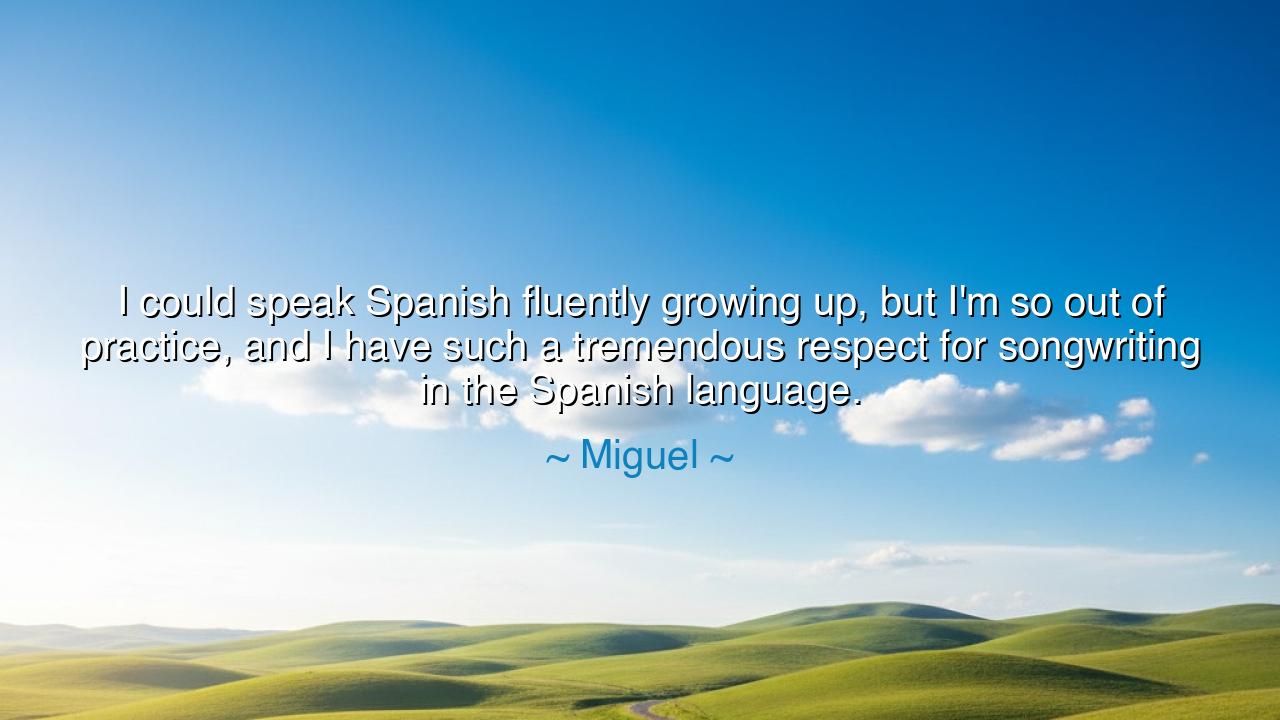
I could speak Spanish fluently growing up, but I'm so out of
I could speak Spanish fluently growing up, but I'm so out of practice, and I have such a tremendous respect for songwriting in the Spanish language.






The words of Miguel—“I could speak Spanish fluently growing up, but I'm so out of practice, and I have such a tremendous respect for songwriting in the Spanish language.”—are more than a confession of language lost; they are a hymn to heritage, a reverence for the power of words, and an acknowledgment of the sacredness of song. To speak a language is not merely to command grammar or vocabulary, but to carry within oneself the rhythms, the soul, the heartbeat of a people. And to lose practice in such speech is not shame, but longing—for in his voice we hear both the echo of fluency once held and the deep respect for the artistry that continues in that tongue.
The ancients knew that language is no mere tool, but the vessel of memory, the guardian of culture. In every syllable lies the wisdom of ancestors, the laughter of children, the lament of the suffering, and the prayers of the devout. When Miguel speaks of the Spanish language, he speaks of a river that has flowed across centuries, carrying with it the music of countless generations. To write songs in such a language is not simply to compose, but to join one’s voice to an eternal chorus. His respect is thus an acknowledgment that in Spanish song lies a beauty greater than the individual—there lies history, community, and soul.
Consider the story of Federico García Lorca, the Spanish poet and playwright whose verses sang of love, sorrow, and the spirit of his people. Lorca believed that true art must contain duende—that mysterious power of depth and emotion, born from struggle and passion. His works, written in Spanish, carried not only his own genius but the heartbeat of Andalusian soil, the cry of gypsy singers, and the yearning of all who long for freedom. Just as Lorca’s language gave him power, so too does Miguel honor the Spanish tongue as a source of strength and profound artistry.
Yet Miguel’s words also carry a note of humility: once he spoke Spanish fluently, but now he admits he has grown out of practice. This is the plight of many children of heritage, torn between languages, living in lands where one tongue dominates while the other fades. It is a reminder that fluency, like any skill, requires nurturing. But even when fluency falters, respect remains, and respect is the seed from which renewal may grow. For one who honors a language may always return to it, like a traveler who knows that the road to home still waits, no matter how long it has been left behind.
There is a lesson here for all: do not take for granted the languages you inherit, for they are treasures. They are the keys to doors that cannot be opened otherwise—the doors of song, of poetry, of memory. To lose practice is natural, but to lose respect is fatal, for without respect the treasure may be cast aside and forgotten. Miguel’s words remind us that even if our tongues falter, our hearts must remain reverent, for reverence leads us back to the path we once walked.
The power of songwriting in Spanish—or in any language—lies not only in its melody, but in the way the words themselves carry worlds of meaning. To sing in Spanish is to embrace the poetry of vowels that flow like rivers, consonants that strike like drums, and phrases that cradle both tenderness and fire. Miguel’s tremendous respect tells us that he sees this not only as craft but as sacred art. In his humility, he acknowledges that joining such a tradition requires more than talent—it requires reverence, patience, and devotion.
Practical action is before us: if you have a language, practice it, cherish it, sing in it, write in it. If you do not, then learn the languages of others with respect, knowing that each carries the soul of a people. Listen to songs not just for their music but for their words, for in them you will find windows into other worlds. And above all, approach language not as a tool but as a gift, for through it we connect not only with the living but with those who came before us.
So let us remember Miguel’s reflection. To be out of practice is human, but to hold respect is divine. He reminds us that in honoring the beauty of a language—especially in the sacred act of songwriting—we honor the culture, the memory, and the spirit of a people. May we, too, live with such reverence, so that no language, no song, no voice of heritage is ever silenced in our hearts.






AAdministratorAdministrator
Welcome, honored guests. Please leave a comment, we will respond soon